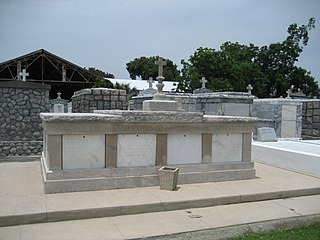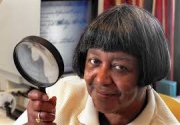Race and ethnicity in the United States Census, defined by the federal Office of Management and Budget (OMB) and the United States Census Bureau, are self-identification data items in which residents choose the race or races with which they most closely identify, and indicate whether they are of Hispanic or Latino origin.

The Bureau of Refugees, Freedmen, and Abandoned Lands, usually referred to as simply the Freedmen's Bureau, was an agency of the United States Department of War to "direct such issues of provisions, clothing, and fuel, as he may deem needful for the immediate and temporary shelter and supply of destitute and suffering refugees and freedmen and their wives and children."

The National Urban League (NUL), formerly known as the National League on Urban Conditions Among Negroes, is a nonpartisan civil rights organization based in New York City that advocates on behalf of African Americans and against racial discrimination in the United States. It is the oldest and largest community-based organization of its kind in the nation. Its current President is Marc Morial.
An African American is a citizen or resident of the United States who has origins in any of the black populations of Africa. African American-related topics include:
Colored or coloured is an ethnic descriptor historically used in the United States, and the United Kingdom with its former colonies. In the United States, the term denoted non-"white" individuals generally. The term now has essentially the same meaning in the United Kingdom, with "coloured" thus equivalent to "people of colour".

James Augustine Healy was an American Roman Catholic priest and the second bishop of Portland, Maine; he was the first bishop in the United States of any known African descent. Born in Georgia to a mixed-race slave mother and Irish immigrant father, he identified and was accepted as white Irish American, as he was half Irish and majority European ancestry. When he was ordained in 1854, his mixed-race ancestry was not widely known outside his mentors in the Catholic Church.
Monsignor John Joseph Egan was an American Roman Catholic priest and social activist. After initially studying business at DePaul University, he transferred to Archbishop Quigley Preparatory Seminary, completing his studies under the visionary rector Msgr. Reynold Henry Hillenbrand at the University of St. Mary of the Lake. He promoted racial integration and was one of the clergymen who marched with Rev. Martin Luther King, Jr. in the 1965 protest march from Selma to Montgomery, Alabama. For many years he was a member of the board of trustees of the Industrial Areas Foundation. The Egan Urban Center at DePaul University is named in his honor. Egan's papers are housed in the manuscript collection at the University of Notre Dame Archives. The scope and background notes include an extensive list of his accomplishments.
The National Black Catholic Congress is an organization of African-American Roman Catholics, founded in 1889 by Daniel Rudd as the Colored Catholic Congress, and revived in the 1980s under its current name. Their symbol is the Acacia. Their mission is to improve and enrich the lives of African-American Catholics. The National Black Catholic Congress (NBCC) operates in close cooperation and coordination with the African-American Bishops of the United States Conference of Catholic Bishops and has received funding support from the Black and Indian mission collection since 1988.

The Sisters of the Blessed Sacrament is a Roman Catholic order of nuns. It was founded in 1891 by Saint Katharine Drexel under the name Sisters of the Blessed Sacrament for Indians and Colored People. It is a Catholic religious institute.

Charles Ewing was an attorney and Union Army general during the American Civil War. He was the son of Interior Secretary Thomas Ewing, the brother of Thomas Ewing Jr. and Hugh Boyle Ewing, and the foster brother and brother-in-law of William T. Sherman. Ewing's sister and Sherman's wife was Ellen Ewing Sherman.
From 1904 to 1991 the Marquette League served as a Roman Catholic fund-raising organization in the United States that supported Catholic missions and schools among Native Americans in the United States.
Francis Paul Prucha was an American Jesuit, historian, and professor emeritus of history at Marquette University. His work, The Great Father, was a finalist for the 1985 Pulitzer Prize in History, and is regarded as a classic among professional historians.
The National Review Board is a committee created in 2002 by the United States Conference of Catholic Bishops in order to monitor the implementation of the Charter for the Protection of Children and Young People in the wake of the clerical abuse scandal in the United States. The Board was also charged with investigating the scandal, which it did in part by commissioning the John Jay College to conduct a survey of Church records in order to define the nature and scope of the abuse committed by priests over the period between 1950 and 2002. The results of that survey were released in 2004 in what has come to be known as the "John Jay Report" or "Nature and Scope report." In parallel with the John Jay College survey the Board conducted interviews with a variety of people, both inside and outside the Church, who were well placed to comment on the scandal, and on the basis of these interviews prepared a more broad-ranging report of its own. Whereas the John Jay College report was primarily a factual summary of the data collected in the College's survey of Church records, the Board's own report sought to interpret these data and its other findings in order to explain why the "epidemic" of clerical abuse had occurred and to identify the appropriate steps to avoid any repetition.
The Tekakwitha Conference is a Roman Catholic institution that supports Christian ministry among Native Americans, primarily through its annual meeting.
The American Teachers Association was a professional association and teachers' union representing teachers in schools in the South for people of color during the period of legal racial segregation in United States. In 1954 the United States Supreme Court ruled in Brown v. Board of Education that segregation of public schools was unconstitutional. The Civil Rights Act of 1964 ended legal segregation.

Agnes Kane Callum (1925-2015) was a genealogist known for her research into Maryland's African-American history. She was a founding member of the Baltimore Afro-American Historical and Genealogical Society, a frequent columnist for The Catholic Review, and the founding editor of a black genealogical journal, Flower of the Forest. Callum was inducted into the Maryland Women's Hall of Fame in 2014.






